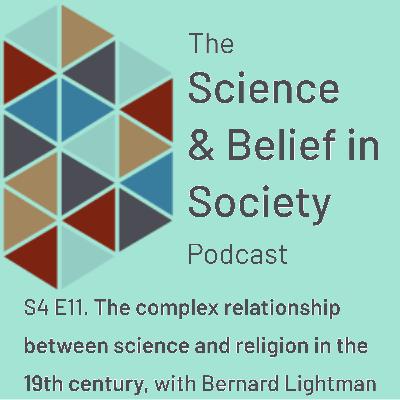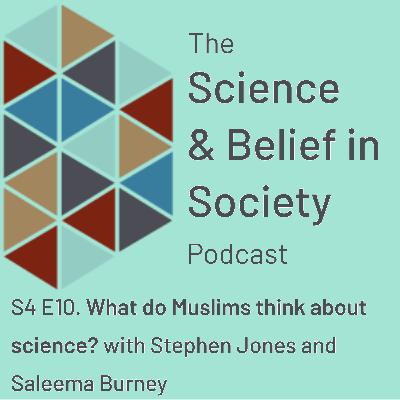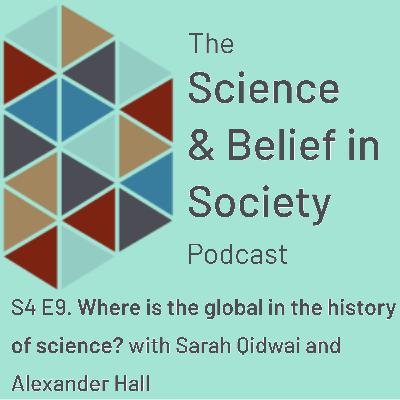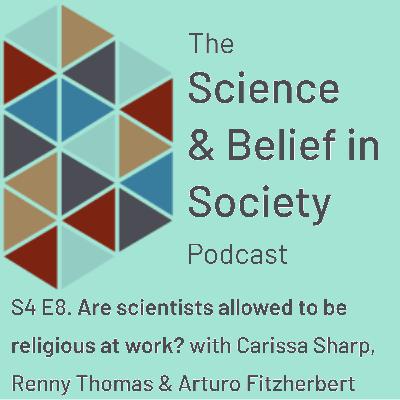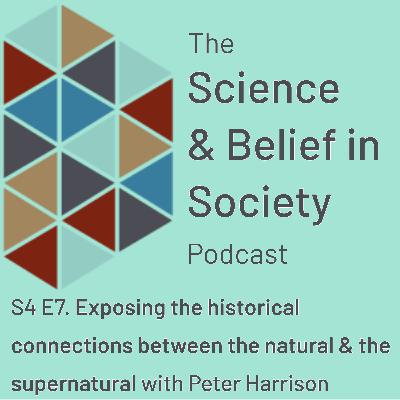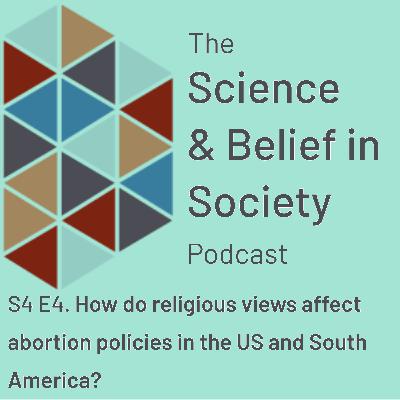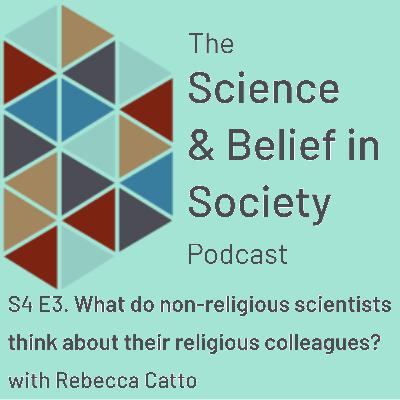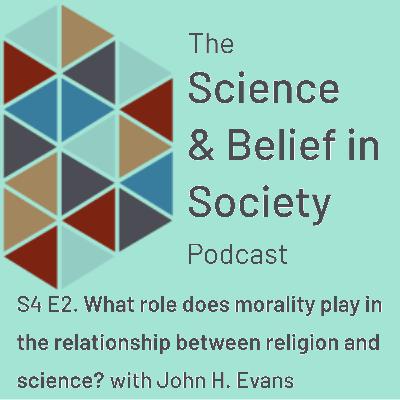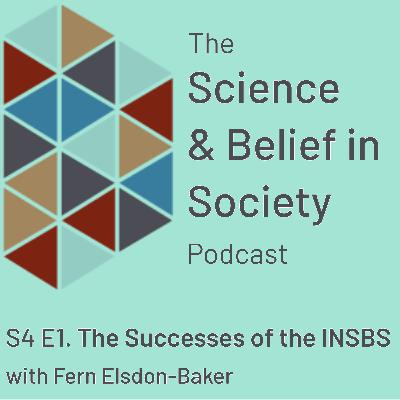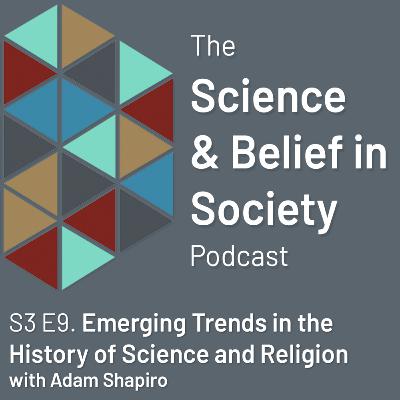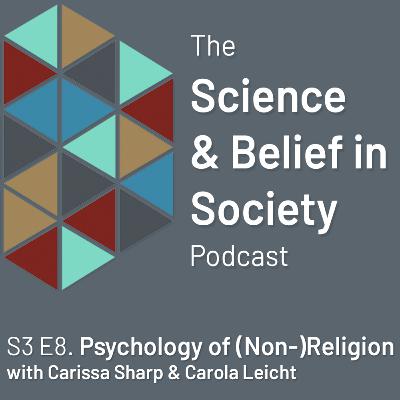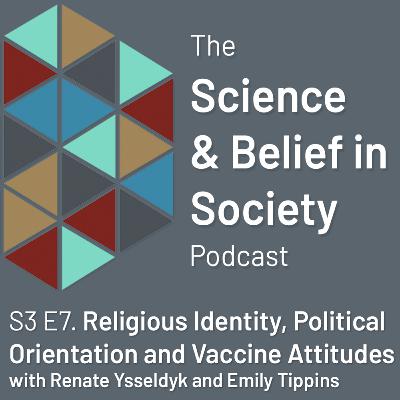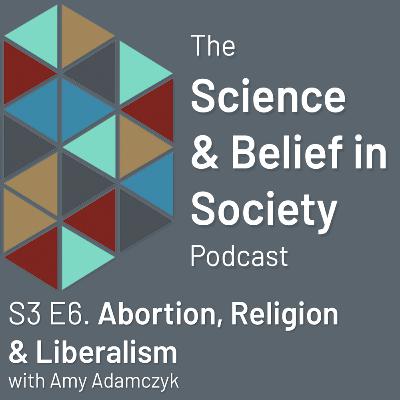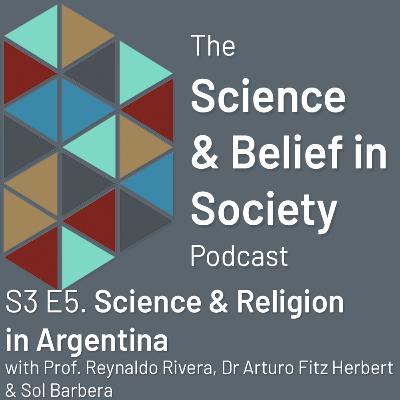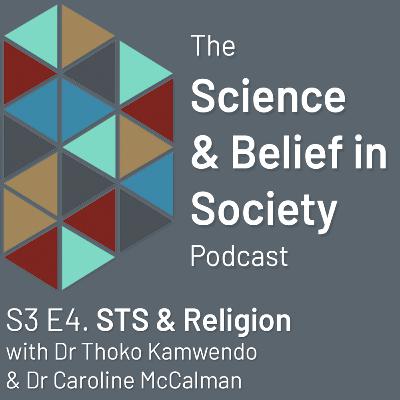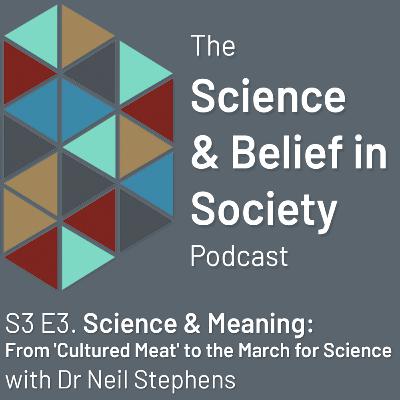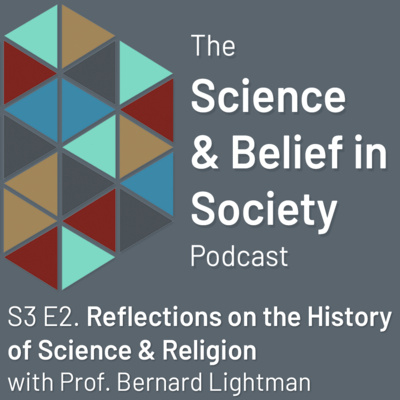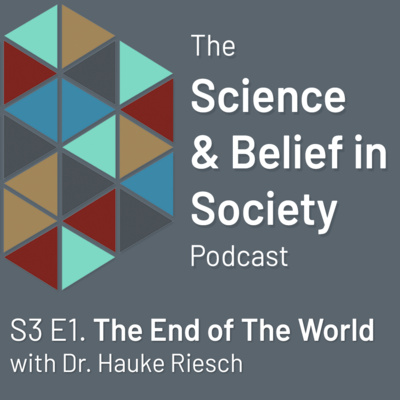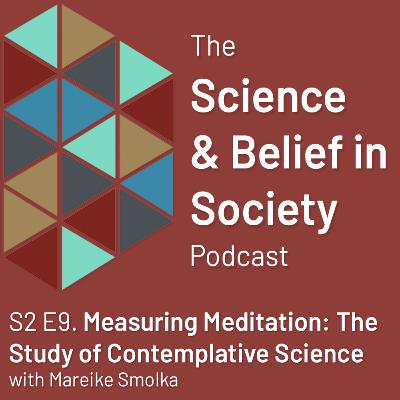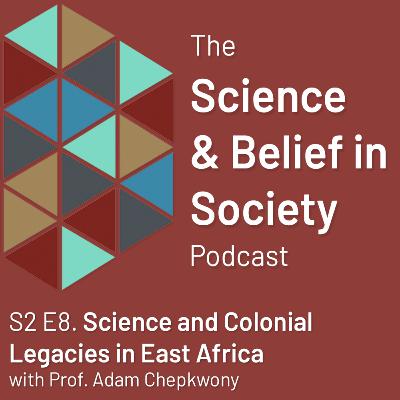Discover The Science & Belief in Society Podcast
The Science & Belief in Society Podcast

The Science & Belief in Society Podcast
Author: International Research Network for the Study of Science & Belief in Society
Subscribed: 18Played: 256Subscribe
Share
© International Research Network for the Study of Science & Belief in Society
Description
A podcast covering the latest research in the social study of science and belief, hosted by Dr Will Mason-Wilkes, Dr James Riley, Dr Rachael Shillitoe, and Dr Richard Grove, Research Fellows at the University of Birmingham. Each episode features Will, James, Rachael and Richard chatting to expert guests about their current research, how their disciplinary approach contributes to our understanding of science and belief in society and their sometimes meandering journeys into the field of science and belief in society research.
42 Episodes
Reverse
Bernard Lightman, a Distinguished Professor of Humanities at York University, in Toronto, Canada, who is best known for his work on the Cultural History of Victorian Science and Religion, talks about some of the highlights of his career and his current international correspondence project digitizing the letters of the Irish physicist, John Tyndall.
Sociologists Dr Saleema Burney and Dr Stephen Jones, now at the University of Keele, were both part of the ‘Science and Religion: Exploring the Spectrum’ project at the University of Birmingham. In this episode they talk about their research exploring what Muslims think about science, drawing from their recent research project ‘Science and British Muslim Religious Leadership’. Taking a straightforward approach centered on asking Muslim religious leaders what they think about science, they talk about the complexities their research revealed.
Dr Alexander Hall, an Assistant Professor at McMaster University in Canada who studies the history ofbiology and environmental science in popular media, and Dr Sarah Qidwai at the University of York in the UK who researches science and Islam in the 19th century, discuss the importance of widening the scope of the history of science and religion.
In this episode, Dr Carissa Sharp, a social psychologist at the University of Birmingham, Dr Renny Thomas, a sociologist at the Indian Institute of Science Education and Research (IISER) in Bhopal, and Dr Arturo Fitz Herbert, from the Communications Department of the Universidad Austral in Buenos Aires in Argentina join Deborah Cohen to discuss what scientists really believe in, and crucially what the public thinks they 'should' or 'do' believe in!
In this episode, Peter Harrison, Professor Emeritus of History and Philosophy at the University of Queensland, talks about his latest book, Some New World: myths of supernatural belief in a secular age, which explores the relationship between the natural and the supernatural across time, from Aristotle to the end of the 20th century.
Dr Amy Adamczyk, Professor of Sociology at John Jay College of Criminal Justice, part of City University of New York, and Dr Reynaldo Rivera and Dr Maria Sol Barbera, from the School of Communications at the Universidad Australin Buenos Aries in Argentina, discuss their research on how different contexts and personal religious beliefs shape people’s health-related attitudes and behaviors, in particular medical interventions such as abortion and assisted conception, at the beginning of life. Amy Adamczyk’s book Fetal Positions, is published by OxfordUniversity Press.
In the third episode of our new series, Dr Rebecca Catto, Associate Professor of Sociology at Kent State University (USA) who was for a decade a Principal Investigator on the Science and Religion, Exploring the Spectrum projects, talks about her research into science and non-religion.
John Evans, Tata Chancellor’s Chair in Social Sciences, Professor of Sociology, and Co-Director of the Institute of Practical Ethics of the University of California San Diego, talks about how his research shows that the religion and science debate should increasingly focus on moral conflict between religion and science, rather than on facts.
Fern Elsdon-Baker, Professor of Science, Knowledge and Belief in Society at the University of Birmingham, looks back at the successes of the network she founded in bringing together researchers from all over the world and from awide variety of disciplines, from psychology to politics and theology to sociology, to gain a deeper understanding of the relationships between science and belief in peoples’ lives.
In the final episode of the season, James and Will are joined by Dr Adam R. Shapiro, an historian of science, whose work focuses on public understandings and misunderstandings of science and the relationship between science and religion. Adam provides an overview of some of the emerging trends in the history of science and religion and situates his own work within this wider disciplinary movement. The discussion ranges from the development of and public controversies surrounding two space telescopes - the James Webb Space Telescope and the 30 Metre Telescope on Mauna Kea; the role of Natural Theology in the American Declaration of Independence; Adam's contribution to the second edition of Thomas Dixon's Science and Religion: A Very Short Introduction; and where and how Adam sees the field moving beyond 'complexity'.
In the penultimate episode of the season, Will and Rebecca are joined by Dr Carissa Sharp, Assistant Professor in Psychology of Religion in the School of Theology and Religion at the University of Birmingham, UK and Dr Carola Leicht, Reader in Organisational Behaviour at the University of Kent, UK. Carissa and Carola discuss their almost decade-long collaboration, using social psychological methods to explore questions of science-religion conflict and how religious and nonreligious social identities drive perceptions of conflict in unexpected ways. Carola presents the in-depth results of her work on atheist and "new atheist" perceptions of science and religion, before Carissa discusses how stereotypes impact both religious and non-religious perceptions. Carissa goes on to discuss a recent grant success supporting her work to develop psychological cross-training for theologians.
In this episode Will is joined by a new co-host Dr Rebecca Hughes, a social psychologist at the University of Birmingham. Will and Rebecca welcome Renate Ysseldyk, Associate Professor in the Department of Health Sciences at Carleton University in Ottawa, Ontario, Canada specializing in Social and Health Psychology, and Emily Tippins, a PhD student at the University of Ottawa, who recently completed her Masters of Science working with Renate at Carleton University. Renate and Emily discuss how religious and non-religious individuals in Canada coped with the stresses of the COVID-19 pandemic and the differential relations between religiosity, trust in science (or lack thereof) and vaccine intentions that exist between religious and non-religious individuals. They complicate this picture further by highlighting the role that political orientation plays in vaccine intentions and trust in science, showing that it can play a greater role than religious/non-religious identity. Renate and Emily discuss the wider societal implications of this, and vaccine hesitancy more generally.
In this timely episode James and Will welcome Amy Adamczyk, Professor of Sociology at John Jay College of Criminal Justice and The Graduate Center, City University of New York. Amy discusses her sociological exploration of attitudes towards abortion, in-vitro fertilisation (IVF) and other assisted reproductive technologies (ARTs), and the role that religious and other socio-demographic factors play in shaping these attitudes. Amy presents the results of a comparative quantitative analysis of attitudes to abortion across 70 countries, before presenting findings of more in-depth qualitative work into attitudes in the US and China, and the role of liberalism in these different contexts. In the Chinese context, abortion is a less contentious issue, and Amy discusses the comparative hardening of attitudes to abortion in the US in the context of the Supreme Court's overturning of the Roe vs Wade decision, which had guaranteed the right to abortion across the US. Amy discusses the international implications of this decision, whilst considering the socio-economic and other demographic factors that influence 'country-level' attitudes to abortion and ARTs.
In this episode James and Will welcome Professor Reynaldo Rivera, Full Professor in the School of Communication and Design, post-doctoral researcher Dr Arturo Fitz Herbert and researcher Sol Barbera from Austral University (Argentina). Reynaldo, Arturo and Sol discuss there work as project partners on the Science and Religion: Exploring the Spectrum of Global Perspectives project, which sees teams of researchers in 8 countries investigate the relationship between science and religion using diverse sociological, social psychological, historical and media/cultural studies methods. Focusing on the Argentinian case, the Austral team present findings from their qualitative and media studies work, showing how the relationship between science and religion is perceived and presented as operating in very different ways depending on the social context (e.g. in professional science vs in more public arenas). The Austral team also discuss their efforts to identify scholars in the region (Latin America) working on similar topics and pull together a network of such scholars - the CRYS Network - to share research and best practice, which has even included establishing their own Spanish-language Science and Belief podcast!
In this episode James and Will welcome Dr Thokozani Kamwendo, post-doctoral researcher at Durham University, and Dr Caroline McCalman, post-doctoral researcher at the University of Birmingham, for a roundtable discussion on the relationship between scholarship in Science & Belief and Science & Technology Studies (STS). Thoko is the editor of a collection exploring this relationship, with Caroline providing a single-authored and a co-authored contribution. As well as hosting the podcast, both James and Will are scholars at the intersection of these disciplines, and are also contributing a chapter each to the volume. In a departure from the usual format, James and Will hand over the hosting duties (at least temporarily) to Thoko, who leads us through the motivation for the volume, before Caroline, James and Will outline their own contributions, before engaging in a more wide-ranging discussion of the value of this kind of inter-disciplinary project for both STS scholars and scholars of Science & Belief.
In this episode we welcome Dr Neil Stephens, Associate Professor in Technology and Society at the University of Birmingham. Neil discusses his 15+ year study of ‘cultured meat’; the processes of its scientific and technological development, how religious authorities have been involved in these processes, and the broader epistemological, ontological and sociological implications of his research. We go on to discuss the March for Science, the value of borrowing concepts from different disciplines, and more broadly, what Science and Technology Studies (STS) and Science and Belief scholars can learn from one another.
In this episode (our first recorded in-person) we talk with distinguished historian of science Professor Bernard Lightman. We discuss his wide-ranging contributions to the historical study of science and religion, from his early work on the origins of agnosticism, to his views on more recent shifts and trends in the field - and the differences between T.H. Huxley and Richard Dawkins.
The Science & Belief in Society Podcast is back - but for how much longer? In this opening episode of Season 3, James and Will welcome Dr Hauke Riesch, Senior Lecturer in Sociology at Brunel University, London, to talk about the end of the world...
Narratives of the apocalypse - stories of how the world will end, and humanity's fate before, during and after these variously prophesied cataclysms, have been a central feature of many global religions. From the threat of nuclear war via global pandemics to the onset of climate breakdown, these narratives are now increasingly prevalent in scientific discourses. We discuss Hauke's work in this area, which has traced the continuities and breakages in how these narratives are deployed in both religious and scientific contexts, the different forms they take and their existential and social function. We also discuss the lighter side of the end times, contrasting apocalyptic narratives with other communication strategies for engagement, including comedy.
Religious practices and their effects are increasingly the subject of scientific investigation. In the field of Contemplative Science, mediative practices drawn from Buddhist traditions are united with techniques of analysis from cognitive and neurosciences.
In this episode, James and Will welcome Mareike Smolka, a PhD Researcher at Maastricht University in Science and Technology Studies and Fullbright Scholar at Arizona State University, who has ethnographically explored this community. Mareike’s work traces the development of Contemplative Science from fringe to mainstream interest, and demonstrates the tensions and trade-offs in play when exploring religious practices from within the boundaries of the neoliberal academy.
In this episode, Richard and Will talk with Professor Adam Chepkwony, a Full Professor of Religion at the University of Kabianga in Kenya. Professor Chepkwony's work covers a wide range of topics including African Religion, Inter-religious Dialogue, Science and Religion, and more. In this episode, Professor Chepkwony provides his perspective on how issues like climate change and the COVID-19 pandemic have affected, and are perceived by, people in Kenya. Additionally, Professor Chepkwony discusses the impacts of colonialism and missionary work in Kenya, including how rigid conceptualizations of Christianity, democracy, and science can sometimes lead Africans to feel like they are living "double lives".


